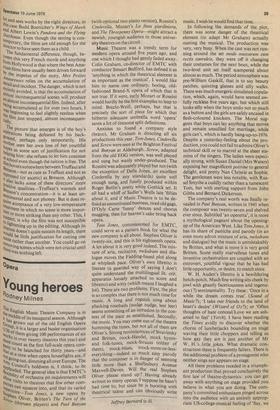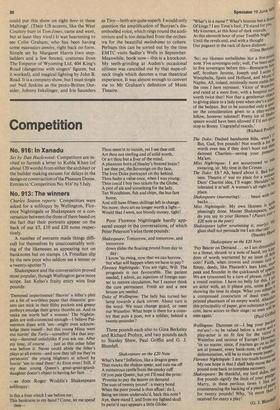° Peta \ f oung heroes
dney Milnes
Thr,
t Music Theatre Company is in he •
it ...Middle of its inaugural season. Although "as grown out of the old English Opera (1r:311P, it is a larger and busier organisation wc,41.(q. them giving 100 performances of six tti-hr's in over twenty theatres this year) and D "st count as the first full-scale opera corn to be launched for thirty years—and nnat at a time when opera houselights are, if AT gcfing out, dimming all over Europe. The Council's boldness is, I think, to be 11:131auded. The general idea is that EMTC's 44ibilitY of orchestra pit requirements will Da-vv. visits to theatres that few other corn Can squeeze into, and that its varied sTertoire—Tom Jones, a new opera by see,Pheri Oliver, Britten's The Turn of the .eh' (thirteen players) and Paul Bunyan
(with optional two-piano version), Rossini's Cinderella, Mozart's La finta giardiniera, and The Threepenny Opera—might attract a newish, youngish audience in those university theatres on the circuit.
Music Theatre was a trendy term for modern opera around five years ago, and one which I thought had gently faded away. Colin Graham, co-director of EMTC with conductor Steuart Bedford, has defined it as 'anything in which the theatrical element is as important as the musical'. I would like him to name one ordinary, boring, oldfashioned Brand-X opera of which that is not true. If it were, early Mozart or Rossini would hardly be the first examples to leap to mind. Brecht-Weill, perhaps, but that is precisely the sort of piece for which that hitherto adequate umbrella word 'opera' saves a lot of tiresome split definitions.
Anxious to found . a company style (bravo), Mr Graham is directing all six productions this year. Tom Jones, Cinderella and Screw were seen at the Brighton Festival and Bunyan at Aldeburgh. Screw, adapted from the old EOG version, was well played and sung but wanly under-produced. The Rossini was adequately played but not (with the exception of Della Jones, an excellent Cinderella by any standards) quite well enough sung, and fussily produced within Roger Butlin's pretty white Gothick set. It all had a whiff of Sadler's Wells late 'fifties about it, and if Music Theatre is to be defined as unmotivated business, tired old gag's, D'Oyly Carte 'funny' dances and chorus mugging, then for heaven's sake bring back opera.
Tom Jones, commissioned for EMTC, could serve as a pattern book for what the new company is all about. Stephen Oliver is twenty-six, and this is his eighteenth opera. A lot about it is very good indeed. The mixture of aria, recitative, melodram and dialogue moves the Fielding-based plot along at whiplash pace. Oliver's own libretto is literate (a guarded way of saying I don't quite understand the multilingual lit. crit. apparatus loosely attached to score and libretto) and witty (which means I laughed a lot). There are two problems. First, the plot is so complex that there is not much time for music. A long and roguish song about plucking rosebuds (nudge nudge, leer leer) seems something of an intrusion 41 the context of the pace as established. Secondly, the music. You may come out of the theatre humming the tunes, but not all of them are Oliver's. Strong reminiscences of Stravinsky and Britten, mock-Handel, mock hymnand folk-tunes, mock-Strauss (either of them), mock-blues, mock-more-or-lesseverything—indeed. so much easy parody that the composer is in danger of seeming little more than aShaftesbury Avenue Maxwell-Davies. Will the real Stephen Oliver please stand up? Having already written so many operas, I suppose he hasn't had time to, but since he is bursting with theatrical talent and can obviously write music, I wish he would find that time.
In following the demands of the plot, there was some danger of the theatrical element (to adapt Mr Graham) actually ousting the musical. The production was very, very busy. When the cast was not running around the set modo muscarum cum rectis caeruleis, they were off it changing their costumes for the next bout, while the two-level unit set itself scampered about almost as much. The period atmosphere was pre-William Gaskill, that is to say beauty patches, quizzing glasses and silly walks. There was much energetic simulated copulation, which, again, would have seemed awfully reckless five years ago, but which still looks silly when the boys undo not so much as a button and the girls are safely encased in flesh-coloured knickers. The Moral suggests that boys can lay anything that moves and remain unsullied for marriage, while girls can't, which is hardly bang-up-to-1976. Despite a yesterday-feeling about the production, you could not fail to admire Oliver's technical skill or to marvel at the sheer stamina of the singers. The ladies were especially strong, with Susan Daniel (Mrs Waters) exposing her magnificent poitrine to general delight, and pretty Nan Christie as Sophie. The gentlemen were less notable, with Russel Smythe a cuddly rather than a tumescent Tom, but with sterling support from John Gibbs and Bernard Dickerson.
The company's real worth was finally revealed in Paul Bunyan, written in 1941 when the composer was twenty-seven and shelved ever since. Subtitled 'an operetta', it is more a mythological pageant about the openingup of the American West. Like Torn Jones, it has its share of pastiche and parody (in an even more adroit mixture of aria, nielodram and dialogue) but the music is unmistakably by Britten, and what is more it is very good Britten. Some really marvellous tunes and inventive orchestration are coupled with an extrovert, youthful vigour that he has had little opportunity, or desire, to match since.
W. H. Auden's libretto is a bewildering hotch-potch. Much fine writing sits cheek by jowl with ghastly facetiousness and ingenuous ( ?) sentimentality. Try these: 'Once in a while the dream comes true' (Sound of Music?); 'I take our friends to the land of heart's desire' (Wizard of Oz?); or 'Often thoughts of hate conceal/Love we are ashamed to feel' (Yelch). I have been reading the Times avidly to discover whether the chorus of lumberjacks bounding on stage waving their little choppers and telling us how gay they are is just another of Mr W. H.'s little jokes. What dramatic construction there is frequently falters. There is the additional problem of a protagonist who neither sings nor appears on stage.
All these problems receded in a triumphant production that proved conclusively the first law of theatre-dynamics: you can get away with anything on stage provided you believe in what you are doing. The com pany's committed enthusiasm pinged across into the audience with an entirely appropriate US-college-musical feeling of 'Say, we
could put this show on right here in these Mailings'. (Their US accents, like the West Country burr in Tom Jones, came and went, but at least they tried.) It was heartening to see Colin Graham, who has been having some mauvaises annees, right back on form. Simple set by Margaret Harris (two stepladders and a few fences), costumes from The Emperor of Wyoming Ltd, 404 King's Road (dangerous with singers' figures, but it worked), and magical lighting by John B. Read. It is a company show, but I must single out Neil Jenkins as the proto-Britten Outsider, Johnny I nkslinger, and Iris Saunders as Tiny—both are quite superb. I would only question the amplification of Bunyan's disembodied voice, which rings round the auditorium and is too detached from the orchestra for the beautiful melodrams to cohere. Perhaps this can be sorted out by the time EMTC visits Sadler's Wells in September. Meanwhile, book now—this is a knockout. My teeth-grinding at Auden's occasional silliness was cancelled out by that nape-ofneck tingle which denotes a true theatrical experience. It was almost enough to convert me to Mr Graham's definition of Music Theatre.



































 Previous page
Previous page